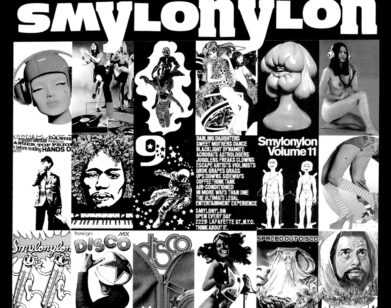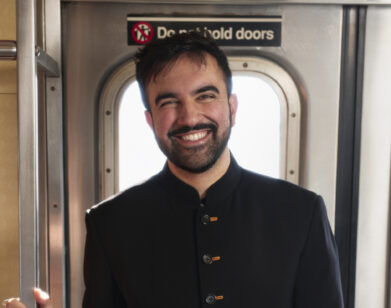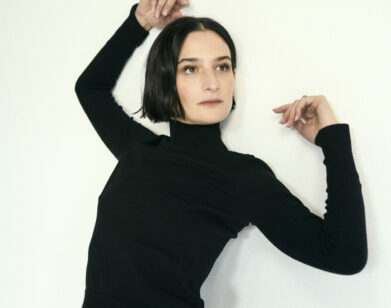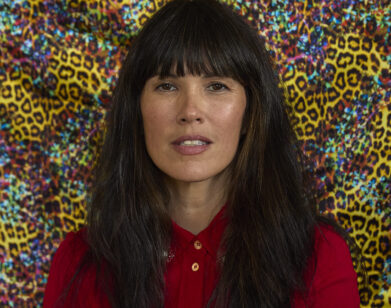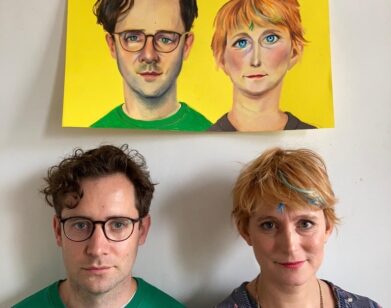Aaron Tveit Will Be Received
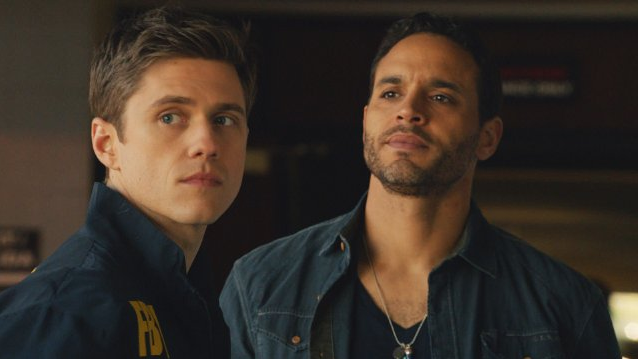
ABOVE: AARON TVEIT (LEFT) WITH DANIEL SUNJATA IN GRACELAND.
Aaron Tveit isn’t just a triple threat; he’s an enigma. At 29, he’s occupied a wider variety of roles on stage and on screen than actors 20 years his senior. Despite his boyish good looks, Tveit has walked a fine line; balancing the steady pace of a working career with projects slightly left of center. On stage, Tveit has treated theatergoers to fancy footwork and a boisterous voice in critically acclaimed productions of Catch Me If You Can, Next to Normal, Wicked, Hairspray, and RENT.
Off stage, Tveit is most prominently known as high-society New York political hopeful Trip van der Bilt on Gossip Girl or, most recently, as the common man’s revolutionary leader, Enjourls, in last year’s Academy Award-winning Les Misérables. But peppered in a résumé of well-known titles are a handful of exercises in indulgence—Sebastian Gutierrez’s A Girl Walks Into A Bar and Rob Epstein and Jeffrey Friedman’s Howl. So what’s next? Tveit tells us about his new role as an undercover agent sent in to investigate his own boss in the new series Graceland and why he’s been singing a lot of Taylor Swift lately.
DAWN KAY: Let’s start with your newest project, Graceland. It premieres on the USA Network on June 6, but the pilot was made available in advance for a limited period of time via on-demand. Can you tell me about your experience with this project thus far?
AARON TVEIT: It was great! We shot the pilot last spring and then we shot the rest of the 11 episodes from October to March. We finished at the beginning of March, and it really was a wonderful experience. When I first read the script, I was really drawn to the character of Mike [Warren], who I play. I just thought that he was a really smart guy. He had a kind of a winning attitude towards everything, in that he was a very hard worker and always tried his best. This is my first series regular role on a television show. I’ve done a lot of guest star work, and the guys that I’ve played haven’t been the greatest guys, [laughs] so it was really nice to read a script where there was this guy who had good intentions, a good moral structure, and who was always going about things in the right way.
And I think that that [moral dilemma] does play into the first season. As it goes on, Mike gets deeper and deeper into his undercover work and further into all of the stuff that happens in the house until his idea of what is right and wrong gets pushed past what he was thinking he’d be okay with. That conflict was a lot of fun to play with.
KAY: Did you do any preparation that was specific to this role? Particularly in relation to Mike’s budding career as an FBI agent?
TVEIT: I did read a lot. There were a couple books that were suggested about undercover agents for us in preparation for the pilot. I was really interested in the fact that in pilot they speak about my character as someone who has just graduated top of his class at the FBI academy. That brought up a lot of questions for me: What does that actually mean? What does someone who has just graduated at the top of his class, what does he tangibly have to be good at? Smart at? I learned a lot about the FBI and how it’s structured. After 9/11, the amount of applicants the FBI received increased exponentially. Whereas you used to require a college degree, and it was a small group of people who were just out of college, after 9/11, it changed. Most applicants that get in now have at least one Master’s degree, so it’s really the crème de la crème of the academic world that then goes into this FBI academy and into law enforcement.
KAY: Oh, interesting…
TVEIT: So to say that Mike was top of his class; you know he’s got to be a brilliant guy. And not only is he great at the physical skills that an FBI agent requires, but the mental aspect, the psychological component behind it. That kind of stuff was good for me to understand. I also read a couple books by former FBI agents that were fascinating. I was really interested in the psychology of what makes these people tick, because I had also read that a lot of these FBI agents burn out because they can’t deal with the day-to-day pressure. I was really looking to see what it took for these people to be amazing at compartmentalizing their lives, being okay with seeing some not-so-great things as long as their eyes were focused on the longer term, and getting out of bed in the morning and looking at themselves in the mirror. So that was a lot of the reading I did. And then over the course of a few weeks, as we got into the season, we met with local law enforcement and they showed us how to handle the guns, how to shoot them, how to clear houses with a real SWAT team. We tried to be as realistic as possible—I mean, hopefully it’s a realistic take on the lives of undercover agents—so it was the little things like how to hold a gun, how the gun should look when it fires so that you look like you know what you’re doing. The cops that we talked to told us that when they watch cop shows they can tell, immediately, when people have no idea what they’re doing just by the way that they’re holding the weapon.
KAY: You’ve spent a lot of your career on stage and in theater. A live performance is essentially fleeting, whereas a film or television production allows you the opportunity to do multiple takes and have them edited with precision—does that affect the way you approach the material? Does one come more naturally to you than the other?
TVEIT: You know, I started working in theater, but I’ve been doing a lot of TV and film stuff over the last five or six years, and at first, when I started working on camera and taking on-camera class, it did seem like it was a totally different bustle, in a way. Especially when you’re just starting out on camera, it can be very intimidating in the fact that it can be a very technical medium. I’ve been really lucky to work in theater, on film and on television over the last three years, at the same time, and I’ve found that it all basically comes from the same place. I do the same amount of preparation and work for everything, and then it’s really just about the execution of how much you show and how much you hold back while you’re doing it. There’s a great quote in Michael Caine’s acting book: He said the art of excellent stage acting is showing the audience all of your mechanics, and the art of acting on film is about hiding the mechanics.
KAY: Of the roles you’ve played to date, which was the most difficult to get?
TVEIT: Catch Me If You Can was a very hard one. Looking back, I wouldn’t change anything about it. I did a national tour of Hairspray in 2005, and I then moved to New York and started in the Broadway company there; so I did that for about a year and a half, playing Link Larkin, which is kind of a young Elvis-type crooner —you know, wonderful show! The same creative team that did Catch Me If You Can did Hairspray—same writers, same directors, etc. You’d think going into something like that you’d have a leg up, but I first auditioned for Catch Me If You Can the summer I went out on tour, which was 2005. I constantly auditioned for it over the next three years and kept not getting it before I finally got it. I had a huge period of growth over that time, and I got it when I was ready and, again, I wouldn’t change anything about it but there was also a certain element that—I knew all the people so well, and they thought of me in one way. I think that, not only did I have to grow to be ready for it, but also I had to shatter their idea of me in order to get that part.
KAY: Is there a role you haven’t been able to play yet, that you’d like to do?
TVEIT: I’d love to play Billy Bigelow in Carousel. I think I’m still a little young for it, but that’s the one role on stage that hopefully I can play one day.
KAY: You did the film adaptation of Les Misérables, which in and of itself was a heavy weight to bear. Of that entire experience, from rehearsals to the mass acclaim it received, what left a lasting impression on you?
TVEIT: It was an experience for me that was so incredible from start to finish, culminating with our performance on the Oscars. It was such an amazing final bow on the experience. That was the first time that we had all sung that song together. Because we shot it in pieces, we actually never sung it together. And it was a really close cast. The thing about that [project] was that everyone came to it from so many different experiences, with musicals or not doing musicals… But everyone came together with such common ground and left everything else at the door and poured their heart and soul into it. So that’s one of the biggest things I remember, especially with not being one of the “movie stars” in the movie, was for me to go in and not feel like I was the odd man out. And the collaboration that everyone not only allowed but also told us that they wanted. Tom Hooper was just so open to all of our ideas.
KAY: I want to circle back to the project you’ve just finished working on in New York—this concert series at 54 Below. How exactly was this conceptualized?
TVEIT: I’ve wanted to do a concert like this for a long time. It’s the first time I’ve ever done it. When I was first putting it together, frankly, I thought for the first time a great introduction would be just to sing songs that meant something to me. It’s a very intimate venue—about 115 seats—so it’s very small and lends itself to a very intimate setting where you can really talk and you can really connect with the audience. Music has been a very big part of my life since I was very young, so it’s really like a journey through music of different songs that have meant different things at different points of my life and why. It’s me sharing a lot of things that I love. I’m really happy with it, because I don’t feel like there’s anything in the whole concert that I’m singing simply to make sound. I think that if you just want to sound good or something, that can really come off as inauthentic, so I’m really happy with where everything landed. It’s been a great experience. I’ve done four [shows] and I have two left this weekend. It’s been wonderful. As much as I love shooting Graceland, I miss singing, so it’s been nice to come off Graceland and have the time to really put myself into something and feel like I’m scratching my singing itch a little bit.
KAY: Which came first for you? Singing or acting?
TVEIT: I’ve always sung. I started at a very young age, and I did a couple plays in high school, but I wasn’t a theater kid growing up, so it wasn’t something I was all about when I was younger. At the same time, looking back now, I’ve always been an avid television watcher and a big movie buff. I watched so many movies when I was a kid, and I’d watch them over and over. Even though I didn’t know that this was where I was going to end up, a lot of what I experienced was influencing, subconsciously, where I would end up later on. I started acting through musical theater, and as I went on, I started taking more and more on-camera and straight acting classes to hopefully expand into the on-camera work.
KAY: Do you think singing is something you would ever do on its own as a career aside from theater?
TVEIT: When I was younger, I guess I thought that was a possibility? I don’t know. I’m open to it in a way… They’re making an album of this show that I am doing, a live album. I don’t know. I don’t write music, or I never have before—so I’m open to it, but that’s not something that I’m actively pursuing. I definitely love to sing, and I definitely want to continue doing theater, but I also really love acting—as much as I love singing. That’s what it has come to in the last couple years. It would be hard for me to do, to have the energy needed to pursue a separate singing career. Who knows what could happen in the future, but I just think it would be hard to designate enough energy to it.
KAY: It seems like an option that would be well received. You’ve had an overwhelming response to the series of live shows, from what I can gather. Your fans essentially broke the venue’s ticketing and e-newsletter system when pre-sale tickets were released, and the entire run sold out quickly. Has it been as easy to implement as you thought? Has the experience of the show met your expectations?
TVEIT: Yeah. I hoped it would be successful and I, of course, hoped that people would like it. At the end of the day, you kind of never know. That’s always in the back of your mind; and I’m a little bit blown away by how well it’s been received, but I put a lot of work into it, so I hoped that people would like it. I thought that people would, but really you never know at the end of the day how it is going to go over. I sing a cover of a Taylor Swift song in the show [laughs] and that was one thing… That was a very late addition to my set list, and I went back and fourth with my music director. I really had no idea going into the first night. I thought it could be a really good idea or I thought it could be, literally, the worst part of my show. I thought it could completely bomb and instead it’s been on of the highlights of the shows every night and the response has been unbelievable. So that’s been interesting…
KAY: Where exactly did this Taylor Swift inspiration come from?
TVEIT: Well, what I say in the show is that I’ve always been a huge fan of pop music. I listen to all kinds of music but I’ve always been a really big fan of Top 40 radio. If I’m in my car, that’s what I listen to. It’s not the only place I listen to it, but whenever I’m in the car, I listen to Top 40 radio, so it’s a nod to that. It’s a song that’s on the radio right now. I sing a lot of stuff that’s on the heavier side, the emotional side, so I thought it would be a nice variance from that stuff—a bit of a lighter moment!
AARON TVEIT STARS ON GRACELAND, WHICH PREMIERES THIS THURSDAY, JUNE 6, AT 10 PM EST ON USA.

